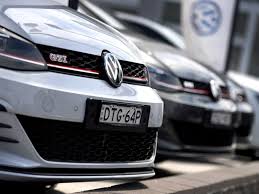European carmakers win big as US backs off tariff threat

Carmakers are the big winners after the United States and European Union announced a ceasefire on trade.
Shares in Volkswagen (VLKAY), BMW (BMWYY), Fiat Chrysler (FCAU), Renault (RNLSY), PSA (PUGOY) and Daimler (DDAIF) advanced on Thursday, with some automaker stocks gaining as much as 5% in Europe.
President Donald Trump and European Commission President Jean-Claude Juncker agreed on Wednesday to work toward eliminating tariffs and barriers on trade. While thin on details, the agreement appeared to lift the immediate threat of new tariffs on European automakers.
Trump had in recent weeks suggested he would put new tariffs on cars — and car parts — imported from Europe.
Obviously the European Union, as represented by @JunckerEU and the United States, as represented by yours truly, love each other! pic.twitter.com/42ImacgCN0
— Donald J. Trump (@realDonaldTrump) July 25, 2018
Higher tariffs on cars would have dramatically increased tensions in the world’s biggest trading relationship. The European Union has already responded to US steel and aluminum tariffs with punitive countermeasures.
The auto industry has warned that increased tariffs would do real damage to jobs, productivity and investment.
A report from UBS warned that 25% tariffs on global car and auto part imports would increase costs for automakers by as much as 18%. Jaguar Land Rover, Volkswagen and BMW would be among the hardest hit brands.
‘No shared vision’
While carmaker stocks zoomed higher, there were significant doubts about whether the agreement would hold.
“It is telling that something with so little substance gets labeled ‘a deal,’ ” said David Bach, a professor at the Yale School of Management. “The big picture hasn’t changed — there is no shared vision for transatlantic trade and no process for getting to one.”
Related: EU warns Trump’s car tariffs threaten $ 300 billion of US exports
Negotiations to lower tariffs and trade barriers promise to be lengthy and arduous. An earlier effort to strike a transatlantic free trade deal was abandoned after encountering political opposition.
“Longer talks would be a success because they would keep Trump from raising auto tariffs; at the same time, they pose the risk of the US president losing his patience at some point,” said Carsten Nickel, a research director at Teneo Intelligence. “Trump might still decide to pull the plug at any time.”
Trump tweeted following the meeting that “European Union representatives told me that they would start buying soybeans from our great farmers immediately.” The president added that Europe would be buying “vast amounts” of liquid natural gas (LNG).
Juncker said the European Union “will build more terminals to import LNG.” That will take years, and even then it’s not clear that Europeans would be willing to pay for American gas, which is generally more expensive than supplies piped in from Russia.
French Economy Minister Bruno Le Maire also quickly stipulated that “agricultural non-tariff barriers are not negotiable.” The European Union is unlikely to accept food imports that don’t meet its standards.
“The reason that the European Union does not import more soybeans from the United States is that many of them are [genetically-modified] strains,” commented Wyn Grant, professor of International Politics at Warwick University.
Related: GM sold these money-losing brands. Now they’re making hundreds of millions
The Trump administration’s approach to trade negotiations with China provides another reason to question whether the EU agreement will stick.
China and the United States announced a truce in May after two rounds of negotiations that were designed to avoid a trade war. But Trump later reversed course and said the United States would impose a 25% tariff on $ 50 billion of Chinese exports.
Since then, each side has imposed tariffs on $ 34 billion of the other’s imports, and they’ve threatened to go further.
“The next few days and weeks will be essential in determining whether increased communication between the US administration and its European counterparts is real,” wrote analysts at Oxford Economics.
